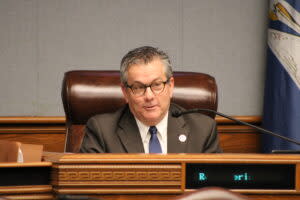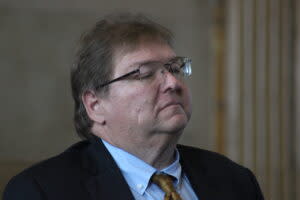Politics pervades effort to adjust Louisiana courts based on population, workload

- Oops!Something went wrong.Please try again later.
Some Louisiana judges have resisted taking part in a study to help the Judiciary Structure Task Force determine whether there are enough jurists assigned to their court districts. (Getty Images)
A study into the workload of state courts is at an impasse because some judges fear the potential political consequences. A task force plans to use the study to determine whether the number of judges assigned to each Louisiana district court aligns with their population, but lawmakers first need to extend its lifespan.
The House Committee on Judiciary advanced House Concurrent Resolution 39 in an 11-5 vote Thursday. If approved, it would give the Judicial Structure Task Force, established in 2022, until Feb. 1, 2025, to provide a report to the Legislature with its recommendations. All Republicans on the committee supported the proposal, while Democrats were split 2-4.
After the committee vote was reported on the House floor Monday, the resolution was assigned to the House and Governmental Affairs Committee. Zeringue told the Illuminator he did not anticipate the move, and it wasn’t discussed with him ahead of time.
The task force, which is composed of lawmakers and judges, has asked judges to calculate their workload through what’s called a workpoint study. It examines data on how many cases they handle, how much time they spend in court hearings and what tasks they perform outside the courtroom, among other items.
Rep. Jerome Zeringue, R-Houma (Greg LaRose/Louisiana Illuminator)
The author of the resolution, Rep. Jerome “Zee” Zeringue, R-Houma, said the study takes into account the complexity of different types of trials and a judge’s additional tasks outside of typical business hours. A judge will not be evaluated only on their case volume, he said.
“Some judges work overtime, and we have some districts, quite frankly — and they get upset when I say this — they have a great golf game because they just don’t spend time in the (courtroom) because the workload’s not there,” Zeringue told the committee.
The effort to evaluate whether court districts have too many or too few judges has been rife with political overtones. Some judges questioned whether the Legislature could hire someone to conduct the workpoint study fairly and insisted that the National Center for State Courts perform it. The independent nonprofit organization evaluates court systems with an eye toward the fair and efficient administration of justice.
Lawmakers agreed to grant the judges’ request, even though they had found a less expensive option, Zeringue said.
Legislators allocated $300,000 for the study when the task force was created in 2022, and more than $100,000 has been spent so far.
Some judges are apprehensive about completing the study because they fear the results could become ammunition for an election opponent who wants to unseat them, said Rep. Robby Carter, D-Amite, chairman of the House Committee on Judiciary.
Carter told Zeringue that judges fear the study will focus only on when they punch in and out of work and not include after-hours aspects of the job, such as approving warrants.
“That’s a red herring by the judges to make sure the study doesn’t go forward,” Zeringue responded.
A moratorium on adding judges to district courts was put in place 10 years ago. The Judicial Council of Louisiana, a research arm of the state Supreme Court, determined that the formula used to figure out if a court needed more judges had become outdated.
Sandra Vujnovich, judicial administrator for the Louisiana Supreme Court, explained to the committee how, before the moratorium, lawmakers would approach a Judicial Council subcommittee to request additional judges. Caseload filing data and other information was analyzed using the existing workpoint formula, with more complex cases given additional weight, she said. However, the old formula doesn’t take into account specialty judicial venues, such as drug courts, and technological advances that have affected court processes and caseloads.
The Louisiana Supreme Court first considered undertaking a workpoint study but declined because the cost was prohibitive, Vujnovich said. Judges have told the Supreme Court they would be willing to participate in the task force’s workpoint study if their concerns about its findings going public are addressed, she said.
The task force went to “great lengths” to address these concerns, but some judges still decided not to move forward, according to Zeringue.
Vujnovich said she has contacted the National Center of State Courts to discuss moving ahead with a workpoint study for Louisiana’s appellate court judges. It’s not clear whether the $200,000 remaining from the money allocated in 2022 for the task force would cover the cost of resuming the research. Just how many district court judges have refused to participate in the study is also uncertain.
Even though the formula for determining how many judges a court needs still hasn’t been updated, lawmakers have requested additional judges for their home districts.
Rep. Robby Carter, D-Amite. (Wes Muller/Louisiana Illuminator)
Carter is seeking an additional judge for the 21st Judicial District, which covers Livingston, St. Helena and Tangipahoa parishes. He originally requested two, but the Judiciary Council determined one would be adequate.
Carter is also carrying a bill that would provide pay raises for all levels of judges in Louisiana. His father, the late Burrell Carter, retired as chief judge of the state’s First Circuit Court of Appeal, where he held a seat for three decades.
Rep. Tony Bacala, R-Prairieville, has requested another judge for the 23rd District, which includes Ascension, Assumption and St. James parishes.
The resolution to extend the task force has support from the Pelican Institute, a conservative think tank, the Louisiana Association of Business and Industry, and the Police Jury Association of Louisiana.
There is no organized opposition to Zeringue’s measure, although judicial policy is a tender spot in the Legislature given the number of attorneys who hold seats — and the frequency at which many go on to become judges.
The resolution is one of multiple pieces of legislation Zeringue, who is not a lawyer, is carrying this session that calls for a closer look at state judges. The judiciary committee also advanced his bill that would require every court in the state to report their revenues and expenses annually to the Louisiana Supreme Court.
The post Politics pervades effort to adjust Louisiana courts based on population, workload appeared first on Louisiana Illuminator.


